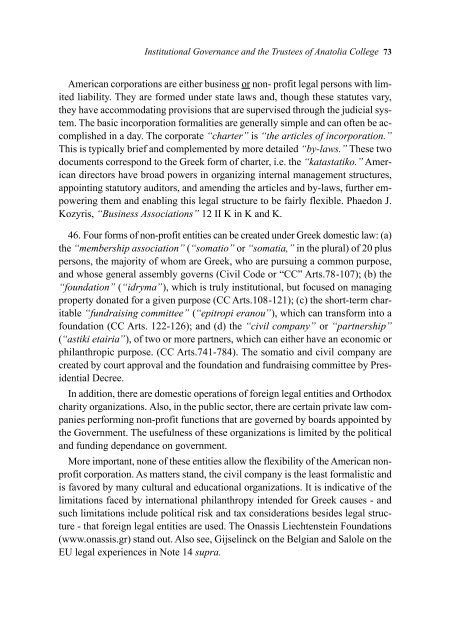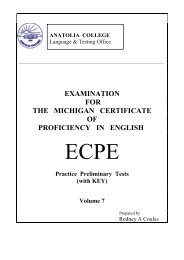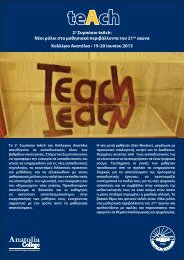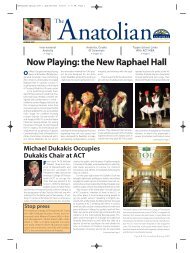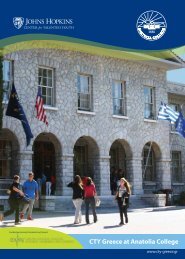ÎÎ´Ï - Anatolia College
ÎÎ´Ï - Anatolia College
ÎÎ´Ï - Anatolia College
- No tags were found...
Create successful ePaper yourself
Turn your PDF publications into a flip-book with our unique Google optimized e-Paper software.
Institutional Governance and the Trustees of <strong>Anatolia</strong> <strong>College</strong> 73<br />
american corporations are either business or non- profit legal persons with limited<br />
liability. they are formed under state laws and, though these statutes vary,<br />
they have accommodating provisions that are supervised through the judicial system.<br />
the basic incorporation formalities are generally simple and can often be accomplished<br />
in a day. the corporate “charter” is “the articles of incorporation.”<br />
this is typically brief and complemented by more detailed “by-laws.” these two<br />
documents correspond to the Greek form of charter, i.e. the “katastatiko.” american<br />
directors have broad powers in organizing internal management structures,<br />
appointing statutory auditors, and amending the articles and by-laws, further empowering<br />
them and enabling this legal structure to be fairly flexible. Phaedon J.<br />
Kozyris, “Business Associations” 12 II K in K and K.<br />
46. four forms of non-profit entities can be created under Greek domestic law: (a)<br />
the “membership association” (“somatio” or “somatia,” in the plural) of 20 plus<br />
persons, the majority of whom are Greek, who are pursuing a common purpose,<br />
and whose general assembly governs (civil code or “cc” arts.78-107); (b) the<br />
“foundation” (“idryma”), which is truly institutional, but focused on managing<br />
property donated for a given purpose (cc arts.108-121); (c) the short-term charitable<br />
“fundraising committee” (“epitropi eranou”), which can transform into a<br />
foundation (cc arts. 122-126); and (d) the “civil company” or “partnership”<br />
(“astiki etairia”), of two or more partners, which can either have an economic or<br />
philanthropic purpose. (cc arts.741-784). the somatio and civil company are<br />
created by court approval and the foundation and fundraising committee by Presidential<br />
decree.<br />
In addition, there are domestic operations of foreign legal entities and orthodox<br />
charity organizations. also, in the public sector, there are certain private law companies<br />
performing non-profit functions that are governed by boards appointed by<br />
the Government. the usefulness of these organizations is limited by the political<br />
and funding dependance on government.<br />
More important, none of these entities allow the flexibility of the american nonprofit<br />
corporation. as matters stand, the civil company is the least formalistic and<br />
is favored by many cultural and educational organizations. It is indicative of the<br />
limitations faced by international philanthropy intended for Greek causes - and<br />
such limitations include political risk and tax considerations besides legal structure<br />
- that foreign legal entities are used. the onassis liechtenstein foundations<br />
(www.onassis.gr) stand out. also see, Gijselinck on the Belgian and salole on the<br />
eu legal experiences in note 14 supra.


